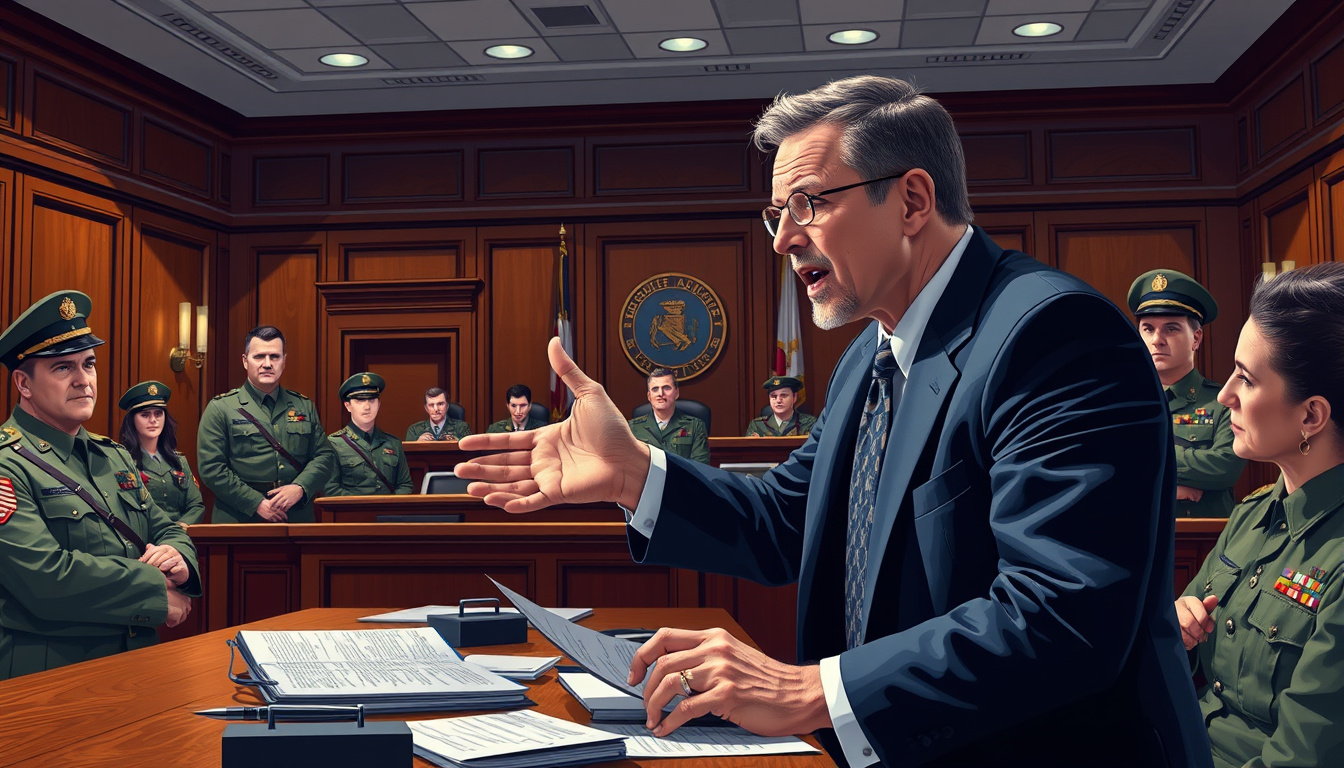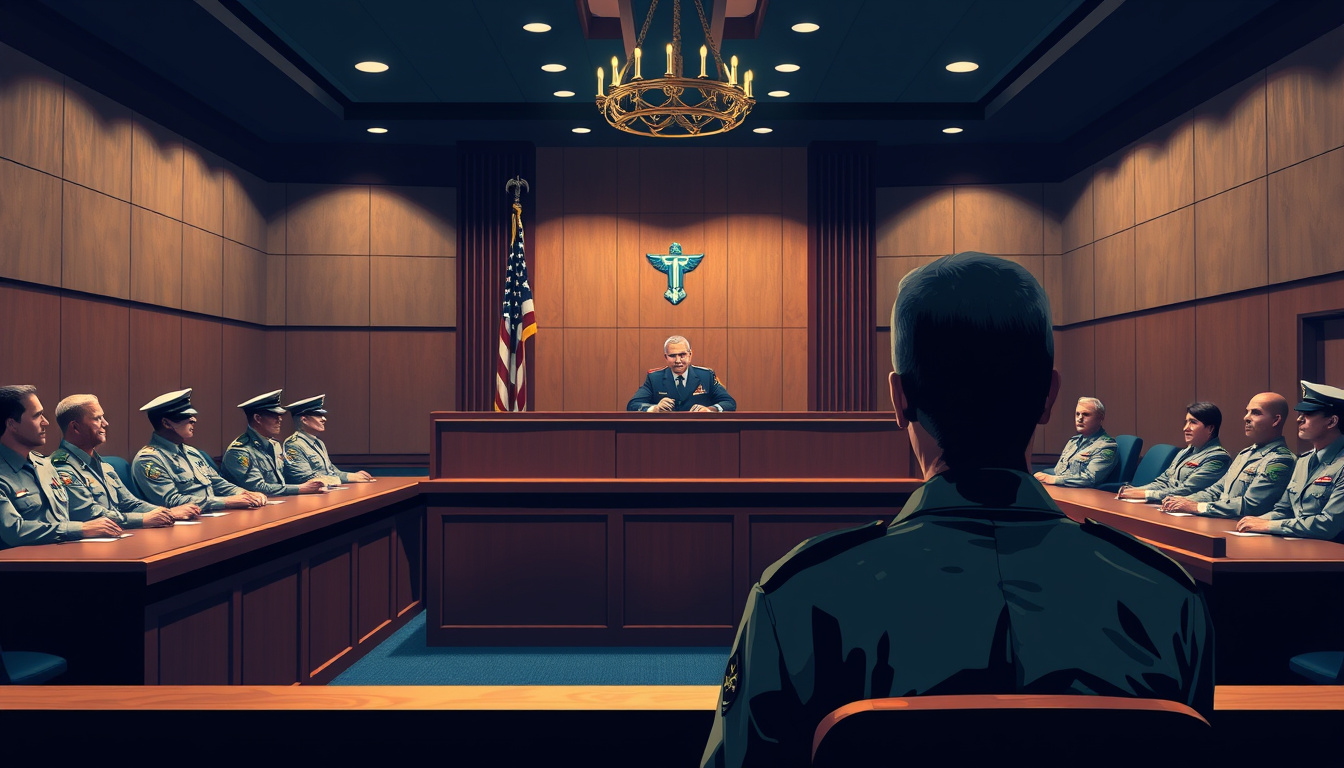Facing a court martial or any disciplinary action in the military is an incredibly daunting experience for servicemembers and their families.
The consequences can be severe, including loss of rank, benefits, and even incarceration.
It is crucial for those embroiled in such situations to understand the intricacies of court martial proceedings and the vital role a court martial defense lawyer plays in protecting their rights.
This article will delve into everything you need to know about court martial, including the legal protections available to you, strategies for building a solid defense, and how to find the right court martial defense lawyer to guide you through this challenging process.

Key Takeaways
- Court martial proceedings differ significantly from civilian courts.
- A court martial defense lawyer plays a crucial role in protecting the rights of the accused.
- Effective defense strategies require thorough understanding of military law and case specifics.
- Common defenses may include lack of intent, self-defense, and claims of unlawful command influence.
- Selecting an experienced court martial defense lawyer is essential for a favorable outcome.
Understanding Court Martial: An Overview
Facing a court martial in the military can be one of the most daunting challenges for servicemembers and their families.
It involves a legal process that can have significant consequences on both your military career and personal life.
Understanding the nuances surrounding a court martial is essential, and having a qualified court martial defense lawyer by your side can make a considerable difference.
This article will provide an overview of court martial procedures, the types of offenses that may lead to a court martial, and the importance of legal representation throughout the process.
This comprehensive guide aims to equip you with the necessary information to navigate this complex terrain more confidently.
The Role of a Court Martial Defense Lawyer
When facing serious allegations under the Uniform Code of Military Justice (UCMJ), the role of a court martial defense lawyer becomes crucial for military servicemembers and their families.
A court martial defense lawyer specializes in defending active-duty military personnel against charges ranging from minor offenses to serious crimes that may result in severe penalties, including imprisonment and dishonorable discharge.
Legal representation in these cases is not just advisable; it is essential for ensuring that the servicemember’s rights are protected throughout the process.
This legal expert not only provides an understanding of military law but also navigates the complexities of court martial procedures.
By working closely with clients, a court martial defense lawyer helps to build a robust defense strategy tailored to the specific circumstances of each case.
Their experience in handling similar cases can often unveil possible defenses and mitigating factors that might lessen the severity of the accusations.
Trusting an experienced defense lawyer can make a significant difference in the outcome of a court martial trial.
‘Injustice anywhere is a threat to justice everywhere.’ – Martin Luther King Jr.

Building a Defense Strategy: Key Considerations
When faced with the serious repercussions of military justice—such as a court martial, allegations of misconduct under the Uniform Code of Military Justice (UCMJ), or an administrative separation—building a robust defense strategy is paramount.
Engaging with a competent court martial defense lawyer is one of the first and most crucial steps you can take.
These professionals understand the intricacies of military law and can tailor a defense strategy that aligns with your unique situation.
Here are some key considerations to keep in mind when developing your defense strategy with your lawyer.
### Understanding the Charges
Before you can build a strong defense, it’s essential to clearly understand the specific allegations against you.
Whether it’s a serious violation of the UCMJ or another form of misconduct, each charge carries different potential consequences.
A skilled court martial defense lawyer will help you decipher the charges and the severity of the potential penalties you face, which can range from non-judicial punishment to court martial proceedings.
This foundational knowledge allows for better preparation and strategy formulation.
### Gathering Evidence
Evidence is the cornerstone of any legal defense.
Your court martial defense lawyer will assist you in gathering relevant documentation, eyewitness accounts, and other forms of evidence that support your innocence or mitigate the circumstances of your case.
This process may involve collecting service records, performance evaluations, and any other material that could sway the decision in your favor.
A comprehensive review of the evidence can help identify weaknesses in the prosecution’s case and form the basis of your defense strategy.
### Identifying Witnesses
Witnesses can play a crucial role in establishing the facts of the case and providing support for your defense.
Your attorney will work with you to identify individuals who can testify on your behalf, whether they are fellow service members, friends, or family members who can corroborate your version of events.
It’s important that your court martial defense lawyer prepares these witnesses effectively to ensure their testimonies are clear, credible, and impactful.
### Legal Precedents and Framework
Military law is distinct from civilian law, with its own set of rules and precedents.
A knowledgeable court martial defense lawyer will be well-versed in these laws and can leverage prior cases to support your defense.
Understanding how similar cases were decided and what legal strategies were successful can provide insight into the best approach to take in your situation.
This aspect of your defense strategy is crucial, as it helps build a legal framework within which your case can be argued effectively.
### Developing a Defense Theory
An overarching theory of defense is critical for framing your case.
Whether your defense is based on factual innocence, asserting a lack of intent, establishing procedural errors, or demonstrating that the evidence was obtained unlawfully, your court martial defense lawyer will work closely with you to develop a coherent narrative.
This theory will guide all aspects of your defense, from the initial plea to closing arguments, ensuring that every element works together towards a singular goal of exoneration or a more favorable outcome.
### Risk Assessment
Every legal strategy carries inherent risks.
Your court martial defense lawyer should conduct a thorough risk assessment, weighing the potential consequences of various defense strategies.
This includes evaluating the strengths and weaknesses of your case, the expected behavior of witnesses, and the stance that military prosecutors are likely to take.
Understanding these risks allows you to make informed decisions about how to proceed, balancing the desire for a complete exoneration with the realities of the legal process.
### Preparing for Court Martial Proceedings
If your case leads to formal court martial proceedings, thorough preparation is essential.
This includes mock trials, witness prep, and strategy sessions designed to ensure you are ready to face the prosecution and present your defense adeptly.
Your court martial defense lawyer will guide you through each step of this preparation, ensuring you are as confident and ready as possible when facing the military court.
### Post-Trial Considerations
Even after a court martial judgment, there may be options for appeal or post-trial motions that could impact the outcome of your case.
If convicted, your court martial defense lawyer can guide you through the appeals process, helping to ensure your case is re-examined for errors or injustices that occurred during the original trial.
Understanding these post-trial options is an essential element of your overall defense strategy and may provide additional avenues to mitigate the consequences of a court martial conviction.
### Conclusion
Navigating a court martial or facing allegations under the UCMJ can be one of the most challenging experiences for military servicemembers and their families.
By building a solid defense strategy with a knowledgeable court martial defense lawyer, you position yourself to effectively confront the allegations, protect your rights, and work toward the best outcome possible.
Remain proactive and engaged in your defense process, as your active participation is crucial in ensuring that your voice and experiences are represented as your case unfolds.
Common Defenses in Court Martial Cases
When facing a court martial, it is essential to understand the various defenses that can be presented to protect your rights and interests.
A court martial defense lawyer can help guide you through the complexities of military law and present a robust defense tailored to your specific circumstances.
Common defenses in court martial cases include:
1.
Innocence: The most straightforward defense argument, asserting that you did not commit the alleged offense.
This defense is vital in establishing reasonable doubt against the prosecution’s claims.
2.
Mistaken Identity: This defense is particularly relevant in cases where allegations are based on witness testimony.
If you can demonstrate that another individual could be responsible for the alleged act, your attorney can argue that you were wrongly accused.
3.
Lack of Intent: Many offenses require the prosecution to prove that you had criminal intent.
If your actions were unintentional or the result of a misunderstanding, a court martial defense lawyer can argue that you did not meet the necessary intent for conviction.
4.
Temporary Insanity or Mental Health Issues: If you can demonstrate that mental health issues impaired your judgment at the time of the offense, this could serve as a valid defense.
Documented mental health concerns can support your case and warrant a more lenient response to the allegations.
5.
Consent: In cases involving personal conduct disputes, the defense may hinge on the argument that consent was given by the other party involved.
Demonstrating that the interaction was consensual can significantly influence the outcome of the case.
6.
Self-Defense: If you were acting in self-defense or in defense of others during a conflict or altercation, your attorney could argue that your actions were justified and necessary under the given circumstances.
7.
Violation of Rights: If there were significant procedural missteps—or if your rights were violated during the investigation or arrest—the defense can argue that evidence obtained unlawfully should be excluded from the proceedings.
Understanding these defenses and working closely with a court martial defense lawyer can provide a stronger footing against the allegations you are facing.
It’s crucial to act swiftly, as addressing these issues head-on can often yield a better outcome.

The Process of a Court Martial: What to Expect
When facing the serious situation of a court martial, understanding the process can help ease the anxiety and uncertainty of military servicemembers and their families.
A court martial is a military legal proceeding intended to address allegations of violations of the Uniform Code of Military Justice (UCMJ).
It is critical to start by consulting a competent court martial defense lawyer who can guide you through each step of this complex process.
Initially, the proceedings may begin with an investigation by the service branch’s command, often involving the collection of evidence, witness testimonies, and statements from the accused.
Depending on the gravity of the allegations, the charges could range from minor infractions to serious offenses such as assault, drug use, or misconduct.
A proficient court martial defense lawyer will ensure that your rights are protected during this stage, advising on how to approach interviews and respond to investigators.
Once an investigation is complete, the commanding officer will determine whether to proceed with charges and to what extent.
The accused will receive a notification, often referred to as a charge sheet, which outlines the specific allegations.
This is a crucial phase where your court martial defense lawyer steps in to assess the charges, identify any legal defenses, and prepare you for upcoming legal battles.
If a court martial is convened, the panel, or jury, might consist of a combination of commissioned officers and enlisted personnel, depending on the severity of the offense.
There are several types of court martials: summary, special, and general; each varies in terms of severity and formality.
A summary court martial is the least severe and is typically used for minor offenses but still requires legal expertise since a conviction can lead to administrative actions or loss of benefits.
A special court martial can impose more severe penalties, while a general court martial handles the most serious offenses and requires robust legal representation.
During the trial, your court martial defense lawyer will present evidence, cross-examine witnesses, and make legal arguments aimed at securing a favorable outcome.
Whether it’s seeking a dismissal of charges, negotiating a plea deal, or advocating for a not guilty verdict, having skilled legal support is key.
Furthermore, if found guilty, a dedicated lawyer can help mitigate potential sentencing impacts through appeals or additional legal channels.
In conclusion, facing a court martial can be daunting, but being informed about the process and having a knowledgeable court martial defense lawyer by your side can significantly influence the outcome.
Families of servicemembers should also remain involved and informed, offering crucial support throughout this challenging time.
With the right legal guidance, the road ahead can be navigated more effectively.
Rights of the Accused in a Court Martial
When military servicemembers are faced with allegations that could lead to a court martial, understanding their rights is pivotal.
A court martial is a judicial proceeding in which military personnel are tried for violations of the Uniform Code of Military Justice (UCMJ).
It is essential for accused servicemembers to be informed about their rights and the importance of legal representation.
One of the crucial steps is consulting a qualified court martial defense lawyer, who can provide guidance tailored to each unique situation.
Servicemembers have the right to request a court martial to contest allegations against them, ensuring they have a fair chance to present their case.
They also have the right to remain silent, meaning they do not have to speak with investigators or make any statements that could incriminate them without legal counsel present.
Importantly, they are entitled to be represented by a court martial defense lawyer, who possesses the expertise in military law needed to navigate the complexities of the UCMJ and ensure that all procedural rights are upheld.
This legal representation is crucial, as a skilled court martial defense lawyer can challenge the evidence against the accused, present mitigating factors, negotiate plea deals, and help navigate the appeals process if necessary.
Additionally, the accused have the right to examine and cross-examine witnesses, ensuring that the proceedings are just and comprehensive.
They also have access to evidence that will be presented against them, thereby allowing their defense to prepare adequately.
Given the gravity of the potential outcomes, including imprisonment, reduction in rank, or discharge, it is essential that personnel facing court martial proceedings do not take these rights lightly.
A knowledgeable court martial defense lawyer can make a significant difference, ensuring that the accused understands each step of the process and that their case is handled with the utmost care.

Choosing the Right Court Martial Defense Lawyer
Navigating the complexities of military law can be daunting for servicemembers and their families, especially when facing the potential of a court martial or allegations under the Uniform Code of Military Justice (UCMJ).
Choosing the right court martial defense lawyer is crucial to ensuring a fair trial and obtaining the best possible outcome.
Start by looking for a defense lawyer who specializes in military law and has extensive experience in handling court martial cases.
An adept lawyer should not only understand the intricacies of the UCMJ but also be familiar with the procedural rules of military courts.
Examine their track record of success in similar cases and seek out client testimonials or references.
Personal rapport is equally important; your lawyer should be someone who listens to your concerns and communicates effectively, providing clarity and guidance throughout the process.
Additionally, consider their approach to defense strategies – a good court martial defense lawyer will be proactive and aggressive in protecting your rights while offering insightful counsel tailored to your unique situation.
Remember that this decision is vital for your career and future, so take the time to conduct thorough research and consult with multiple attorneys before making your final choice.
Frequently Asked Questions
What is a court martial?
A court martial is a military tribunal appointed to try members of the armed forces accused of violations of military law.
What does a court martial defense lawyer do?
A court martial defense lawyer represents service members who are accused of military offenses, helping them navigate the legal process and build a strong defense.
What are common defenses in court martial cases?
Common defenses may include lack of intent, self-defense, insanity, unlawful command influence, or asserting that the accused did not commit the act in question.
What rights do accused service members have in a court martial?
Accused service members have rights such as the right to legal representation, the right to remain silent, the right to present evidence, and the right to a fair trial.
How do I choose the right court martial defense lawyer?
Look for a lawyer who specializes in military law, has experience with court martial cases, communicates effectively, and has a strong understanding of the military justice system.
If you or a loved one is under investigation or facing charges under the UCMJ, don’t wait to protect your future. Contact Gonzalez & Waddington, Attorneys at Law. Our battle-tested military defense lawyers have successfully defended service members worldwide against the most serious military offenses. Call us today for a confidential consultation and put our elite military defense attorneys in your corner.



